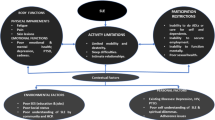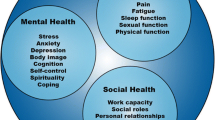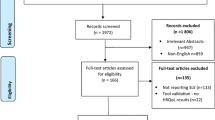Abstract
Our aim was to test for ethnic differences in the number of children, number of miscarriages, family support and the impact of the disease on daily living among patients with systemic lupus erythematosus (SLE). Patients with SLE (n = 54) who attended two hospitals in Essex, UK, were asked to complete a semi-structured, validated questionnaire. The number of children and the number of miscarriages were reported numerically. The level of family support and the impact of the disease on daily living were reported using 10 cm visual analogue scales (VAS) in which 10 cm represented the maximum support and worst effect on daily living, respectively. There were 20 Caucasian, 22 Asian and 12 African/Afro-Caribbean patients. There were 50 females and four males. The mean ± standard deviation (SD) age was 45.9 ± 12.2 years, and the mean ± SD age at disease onset was 35.6 ± 11.1 years. Overall, 34/50 female patients (68 %) reported having children of their own, while 17/50 female patients (34 %) reported one or more miscarriages. The miscarriages were mostly reported by Caucasian patients (45 % versus 18.1 % for Asian and 33.3 % for African/Afro-Caribbean patients; P < 0.05). All of the groups received support from their families (90.7 % overall), but the level of support was greater for Caucasian (mean ± SD VAS, 6.6 ± 3.4 cm) than for Asian (5.4 ± 3.9 cm) and African/Afro-Caribbean (5.4 ± 4.9 cm) patients (P = 0.06). More than half of the patients (53.7 %) reported a severe impact of SLE on daily living, while 13 % reported a moderate impact, 22.2 % reported a mild impact and 11.1 % reported no impact. The impact of SLE on daily living was significantly worse for African/Afro-Caribbean patients compared with Asian patients (P < 0.05). Overall, one in two patients with SLE reported having children of their own, while one in three patients reported having at least one miscarriage. Ninety percent of the patients received family support for their disease. Miscarriages and family support were more frequently reported by Caucasian patients. Asian patients had more children and experienced fewer miscarriages, while African/Afro-Caribbean patients reported a worse impact of the disease on daily living compared with the other ethnic groups.


Similar content being viewed by others
References
Carmona F, Font J, Cervera R, Munoz F, Cararach V, Balasch J (1999) Obstetrical outcome of pregnancy in patients with systemic lupus erythematosus. A study of 60 cases. Eur J Obstet Gynecol Reprod Biol 83:137–142. doi:10.1016/S0301-2115(98)00312-1
Clowse ME, Magder LS, Witter F, Petri M (2006) Early risk factors for pregnancy loss in lupus. Obstet Gynecol 107:293–299
Bramham K, Hunt BJ, Bewley S et al (2011) Pregnancy outcomes in systemic lupus erythematosus with and without previous nephritis. J Rheumatol 38(9):1906–1913
Molokhia M, Maconochie N, Patrick AL, Doyle P (2007) Cross-sectional analysis of adverse outcomes in 1.029 pregnancies of Afro-Caribbean women in Trinidad with and without systemic lupus erythematosus. Arthritis Res Ther 9(6):R124
Ekblom-Kullberg S, Kautiainen H, Alha P et al (2009) Reproductive health in women with SLE compared to population controls. Scand J Rheumatol 38:375–380
Clowse ME, Magder LS, Witter F, Petri M (2005) The impact of increased lupus activity on obstetric outcomes. Arthr Rheum 52:514–521
Chakravarty EF, Nelson L, Krishnan E (2006) Obstetric hospitalisation in the United States for women with SLE and RA. Arthritis Rheum 54:899–907
Hopkinson ND, Doherty M, Powell RJ (1994) Clinical features and race specific incidence/prevalence rates of systemic lupus erythematosus in a geographically complete cohort of patients. Ann Rheum Dis 53:675–680
Lau CS, Yin G, Mok MY (2006) Ethnic and geographical differences in systemic lupus erythematosus: an overview. Lupus 15:715–719
Molokhia M, McKeigue P (2006) Systemic lupus erythematosus: genes versus environment in high risk populations. Lupus 15:827–832
Sule S, Petri M (2006) Socioeconomic status in SLE. Lupus 15:720–723
Tan EM, Cohen AS, Fries JF et al (1982) The revised criteria for the classification of systemic lupus erythematosus. Arthritis Rheum 25:1271–1277
Roussou E, Iacovou C, Weerakoon A, Ahmed K (2011) Stress as a trigger of disease flares in SLE. Rheumatol Int. doi:10.1007/s00296-011-2292-1
Edwards RR, Doleys DM, Fillingim RB, Lowery D (2001) Ethnic differences in pain tolerance: clinical implications in a chronic pain population. Psychosom Med 63:316–323
Njobvu P, Hunt L, Pope D et al (1999) Pan amongst ethnic minority groups of South Asian origin in the UK: a review. Rheumatology 38:1184–1187
Ang DC, Ibrahim SA, Burant CJ, Kent Kwoh C (2003) Is there a difference in the perception of symptoms between African Americans and whites with osteoarthritis? J Rheumatol 30:1305–1310
Le HD, Wechsler B, Vauthier-Brouzes D et al (1997) Outcome of planned pregnancies in SLE: a prospective study of 62 pregnancies. Br J Rheumatol 36:772–777. doi:10.1093/rheumatology/36.7.772
Rahman FZ, Rahman J, Al-Suleiman SA, Rahman MS (2005) Pregnancy outcome in lupus nephropathy. Arch Gynecol Obstet 271:222–226
Weisscher N, de Haan RJ, Vermeulen M (2007) The impact of disease-related impairments on disability and health-related quality of life: a systematic review. BMC Med Res Methodol 7:24–34. doi:10.1186/1471-2288-7-24
Aaronson NK (1988) Quality of life: what is it? How should it be measured? Oncology 2:69–76
Roussou E, Appanna M, Ahmed K (2009) Acculturation index and its use on patients' knowledge in lupus disease. Rheumatology 48:44–51
Disclosures
None.
Author information
Authors and Affiliations
Corresponding author
Rights and permissions
About this article
Cite this article
Roussou, E., Weerakoon, A., Iacovou, C. et al. Ethnic differences in the number of miscarriages, number of children, perceived family support and the impact of the disease on daily living in patients with systemic lupus erythematosus. Clin Rheumatol 32, 1223–1228 (2013). https://doi.org/10.1007/s10067-013-2234-2
Received:
Revised:
Accepted:
Published:
Issue Date:
DOI: https://doi.org/10.1007/s10067-013-2234-2




